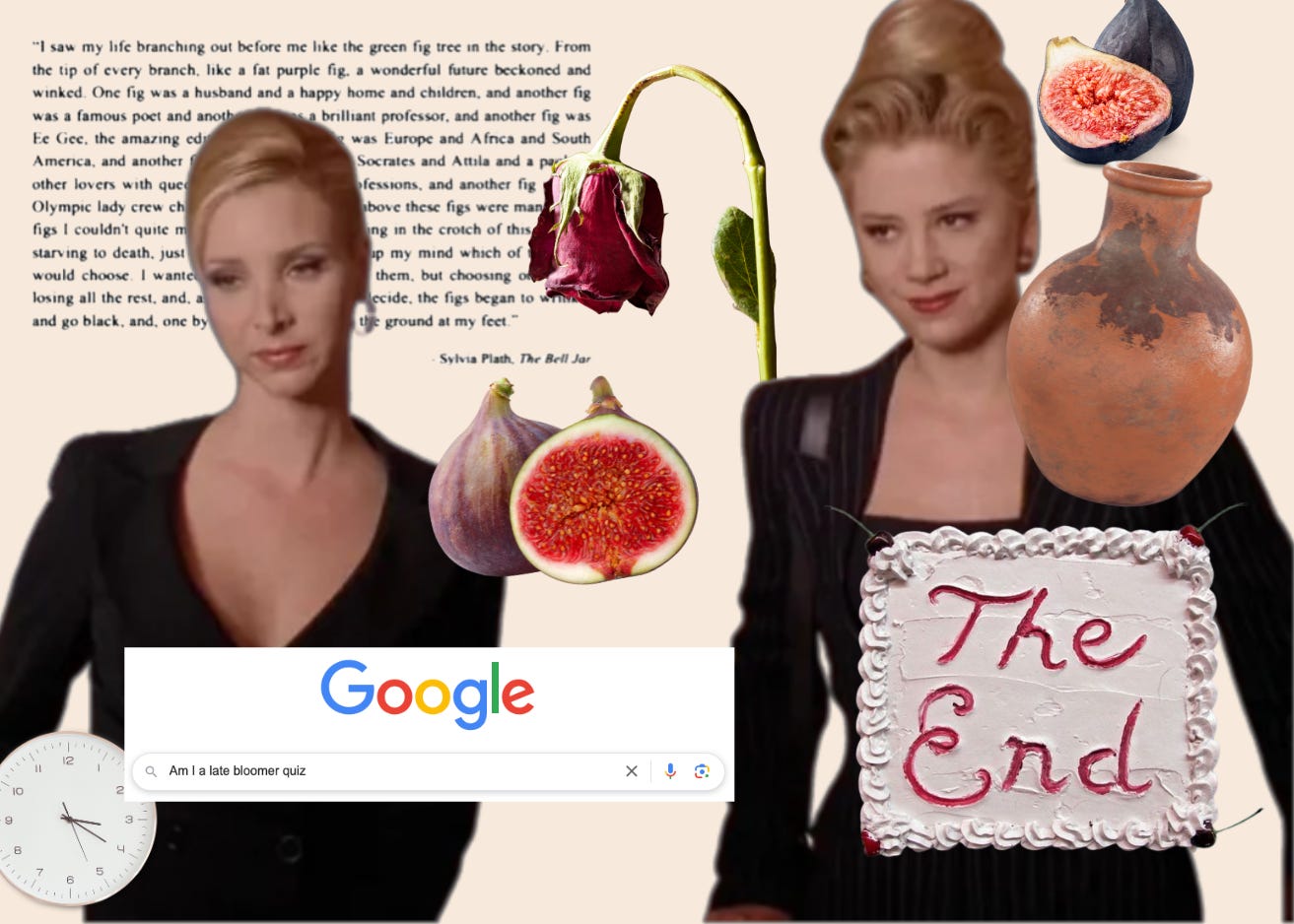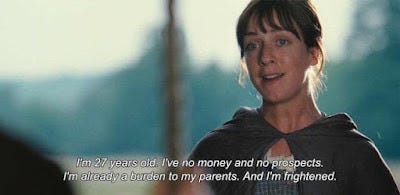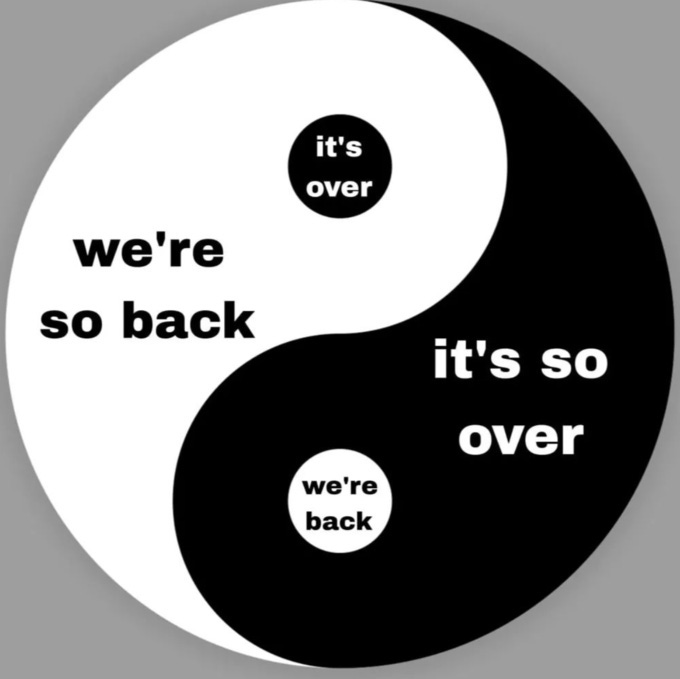20 life lessons from a late bloomer
A 30-something's take on the grief and freedom of feeling lost in your 20s, Sylvia Plath's Fig Tree, and the hidden gift of choice
Every year around my birthday I write myself a letter in my journal to read next year. This ritual marks the passage of time, locates glimmers of growth, and carefully lays out the hopes that I have for myself one year from then. It’s a sweet and private time capsule, one that usually makes me feel both amused and sentimental, but it can also be a crystal ball. I consider this a devotional practice—like leaving a glass of water and two ibuprofen on my bedside table before I leave for a night out. A kiss on the forehead and words of encouragement from a recent self.
It's the closest I've managed to get to developing a 5-year plan, a concept that I've struggled with for years because of how corporate and vulgar it feels. Up until recently, I could hardly believe that people would apply something that was effectively popularized by Joseph Stalin to their own personal lives, but they do, and it works for them. I don't have a carefully laid out plan, though my hope is to embrace the discomfort and create one sometime soon in a way that feels authentic to me rather than restrictive or sterile. I do usually have some loose goals for myself—intentions with no defined roadmap. These letters set those intentions. When I read them back the next year, I'm giddy to compare it with reality and see what came to pass and what changed.
I remember maybe a decade ago, I was visiting my hometown for Christmas and saw some girls from high school at the bar. In our quick catch-up, I learned that they were well on their way to becoming lawyers, professional artists, broadway stars, and financiers. I paled in comparison simply because when it was my turn to share what I was up to, it sounded so frivolous. They seemed so sure of themselves, which only seemed to confirm that I was doing it all wrong. It's around this time I accepted my diagnosis as a late bloomer.
What I understand now is that your 20s are an extension of youth. Those years are a second shot at being a teenager, without the constant guidance, surveillance, and expectations of parents and teachers—but this time the mistakes are yours to own. It’s up to you to decide whether or not you learn lessons and develop a clearer understanding of yourself and your values. The idea that you become an adult at 18 and are thrust into the responsibilities of being one is a farce—a child drowning in their father’s suit and puffing on a chocolate cigarette. Unless you’re in some rush to settle down, your 20s are Adult Lite, and you get to decide what that means for you. Your brain hasn’t even finished developing yet, and there’s still an impulse to play, learn, and lean into the uncertainty.
But it's never as easy as that. What prevents most women from the impulse to experiment in these years is external pressure. When you're inching towards your 30s with no partner, no impressive job title, with what feels like no true calling, the existential panic sets in at some point, usually when you realize your life is being observed by other people, and nothing matters more to a woman in her 20s than what someone else might think, though I would've denied that at the time.
Late bloomers understand the torment of being told by therapists that everyone is on their own timelines, or that there's no rush. It's so easy to hand out that advice when you know exactly what you're doing and where you'll go from there. I stopped looking for confirmation that I wasn't a total failure from women who had it all figured out, and I started looking for stories from other late bloomers who could validate my path. Women who reinvented themselves in their 30s by pivoting to a new career, or women who didn't find their true footing or success until their early 40s and beyond. These were the voices who gave me comfort and made me feel like I wasn't wasting my life away.
I just had a birthday—I’m in my mid-thirties now. If you're in your 20s or early 30s, this might be where you'd expect a tidy resolution. But honestly, I woke up feeling heavy, hit with that familiar pang of sadness over what I lack. It’s human to know better—to see your progress, have plenty to be proud of—yet still grieve the life you thought you’d have. A new decade doesn't solve these inconsistencies, but I’m now able to have these feelings without being consumed by them. I can more quickly and easily access the quiet pride in taking my time to make choices that truly resonate with me, while building a collection of experiences that are just for me.
These conflicting feelings—pride in my journey alongside grief for paths not taken—remind me of the fig tree allegory in The Bell Jar, where the narrator Esther is so overwhelmed with the different life paths in front of her, she becomes paralyzed by choice. This metaphor passes through the hands of young women who understand possibility as a burden rather than a gift. I think we're conditioned to resist choice, which is why so many people just pick a career path early in their lives and stick it out. One less choice is one less opportunity to lose. I see this differently. While one choice often means accepting that others fall away, the tree will continue to bear fruit. In this sense, there is no “wrong” choice, only choices that bring you to more choices. If I hadn’t gotten an arts degree before my business degree, I wouldn’t have built my own business as a copywriter. If I hadn’t pursued pottery, I wouldn’t have known how strong my need for art and creativity would be.
The majority of the women in our ancestry didn't experience the privilege of blooming late—because most of them didn't have the privilege of blooming at all. There was no search to find identity. They were expected to marry and have children young, and an education or career exploration were out of the question. Their destiny was written by societies who wanted them scarce and obedient. This context helps me see more clearly how late blooming has been a gift, not a loss. I don't often feel oppressed or paralyzed by my figs anymore. I see an opportunity to experiment. I see freedom. If one option doesn't work, I try another—I keep trying until something feels right. Blooming late means gaining the wisdom to see opportunities as renewable.
It’s okay if you can’t feel the wisdom yet. My hope is to show people like me that they’re not behind, they’re right on time. It just looks a little different than what we’ve come to believe is right. I’ve found comfort in the wisdom of other late bloomers, and I hope to pay that forward. I've put together 20 of the most important lessons I've learned through my experiences. Take them or leave them, but know you'll be fine. That's not a platitude, it’s a promise.
Identify 5-7 core values and build your life around them. Audit and adjust every year.
Your definition of success should evolve as you do—give yourself permission to rewrite it.
You can reinvent your life at any moment. Starting over is a gift.
A wrong decision won't derail you, but repeating the same patterns over and over will.
Intuition is built by paying the price of ignoring it.
Have an FOF (Fuck Off Fund) that gives you financial freedom to walk away when necessary.
Around the corner of every "it's so over" is a "we're so back."
Know your non-negotiables and honour them.
Be woo woo if you want to be woo woo—just keep one foot in reality.
Get comfortable with not knowing why someone else did something to you.
Let yourself outgrow people and versions of yourself even if it’s uncomfortable.
Most situations have no heroes or villains—just people doing their best with what they have.
Words mean nothing. Someone's consistent actions reveal their truth.
The people who seem to have it all together are just better at hiding their chaos.
When someone has an issue with you, that's their business to resolve, not yours.
What attracts you to others often reflects the potential you see in yourself.
When multiple people offer the same feedback, it's not coincidence—it's a pattern to address.
The antidote to anxiety is action.
You're only as good as the people you surround yourself with.
What is infinitely worse than making the "wrong" decision is never making one at all.
A (realistic) list of things a woman should have by 30:
More flexible, nuanced opinions
An income
Greater empathy for your fellow man
A spatula you like
A spatula you don’t like
At least 3 friendships that are in the process of being audited
The desire to pay down, rather than accumulate, debt
Until next time,
Ines








Gorgeous! From a fellow late bloomer, and proud chaos-hider, all of this speaks to my early experiences too. Gratefully, filled with some wisdom now to take forward into the next decade. Thank you for writing it!
love a Sylvia Plath callout, and also feel surprisingly comforted by the idea that I have the spatulas I like/don't like covered, so maybe I am exactly where I need to be 😌